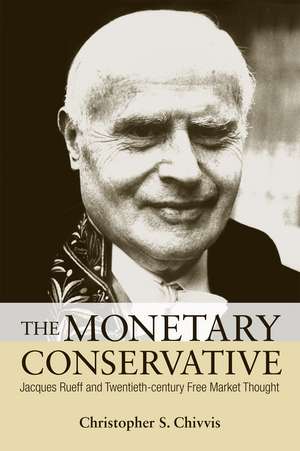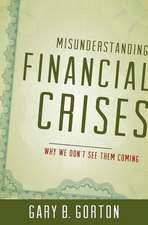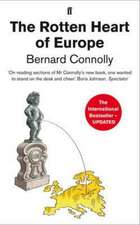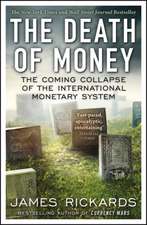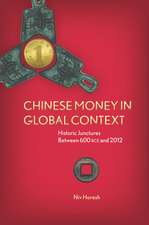The Monetary Conservative: Jacques Rueff and Twentieth-century Free Market Thought
Autor Christopher S. Chivvisen Limba Engleză Hardback – 29 apr 2010
One of the 20th century’s most prescient critics of the role of the U.S. dollar in the global economy, Jacques Rueff (1896–1978) was also one of Europe’s foremost free market thinkers, a proponent of the gold standard, and a major expert on the perils of inflation. In Rueff’s day, moderate conservatism was linked with liberal political economy, and Rueff considered himself a “liberal” in the sense that he believed in the free market. This first major English-language work on Rueff explains his economic philosophy and its significance for the present, placing it in the context of the Great Depression and Europe’s post-World War II recovery.
Chivvis presents a new angle on the history of free market ideas and their alternatives, illuminating a conservative strain of free market thought hitherto much ignored. Rueff’s thought remains highly relevant in the current economic climate, and The Monetary Conservative will be of broad interest to policymakers and educated lay readers. It is also essential reading for economists, political economists, and historians of neoliberalism, France, and modern European politics.
Preț: 151.58 lei
Nou
Puncte Express: 227
Preț estimativ în valută:
29.00€ • 30.28$ • 24.01£
29.00€ • 30.28$ • 24.01£
Carte disponibilă
Livrare economică 14-28 martie
Preluare comenzi: 021 569.72.76
Specificații
ISBN-13: 9780875804170
ISBN-10: 0875804179
Pagini: 248
Ilustrații: 5
Dimensiuni: 152 x 229 x 23 mm
Greutate: 0.52 kg
Ediția:1
Editura: Northern Illinois University Press
Colecția Northern Illinois University Press
ISBN-10: 0875804179
Pagini: 248
Ilustrații: 5
Dimensiuni: 152 x 229 x 23 mm
Greutate: 0.52 kg
Ediția:1
Editura: Northern Illinois University Press
Colecția Northern Illinois University Press
Recenzii
“A deeply thoughtful, nuanced, and erudite analysis of one of the 20th century’s most profound and principled monetary thinkers. With the renewed global angst over the sustainability of the dollar-based international monetary system, Chivvis’s masterful study of Jacques Rueff could not be more timely.”—Benn Steil, Senior Fellow and Director of International Economics, Council on Foreign Relations and co-author of Money, Markets, and Sovereignty
“Mr. Chivvis has written an interesting and clear account of the major elements in the thought of the French economist and civil servant Jacques Rueff.”—Harold James, Princeton University
“An interesting, highly readable account of the career of one of Europe’s most important economists. Chivvis lifts the smokescreen of simplicity which has served to obscure the economist’s true contribution to twentieth century economic thought and practice. This is the clearest history (in my view) of twentieth century French monetary policy. Nothing else compares.”—Timothy Smith, Queen’s University
Notă biografică
Christopher S. Chivvis is a political scientist with the RAND Corporation and teaches International History at the Johns Hopkins University, School of Advanced International Studies.
Descriere
One of the 20th century’s most prescient critics of the role of the U.S. dollar in the global economy, Jacques Rueff (1896–1978) was also one of Europe’s foremost free market thinkers, a proponent of the gold standard, and a major expert on the perils of inflation. In Rueff’s day, moderate conservatism was linked with liberal political economy, and Rueff considered himself a “liberal” in the sense that he believed in the free market. This first major English-language work on Rueff explains his economic philosophy and its significance for the present, placing it in the context of the Great Depression and Europe’s post-World War II recovery.
Chivvis presents a new angle on the history of free market ideas and their alternatives, illuminating a conservative strain of free market thought hitherto much ignored. Rueff’s thought remains highly relevant in the current economic climate, and The Monetary Conservative will be of broad interest to policymakers and educated lay readers. It is also essential reading for economists, political economists, and historians of neoliberalism, France, and modern European politics.
